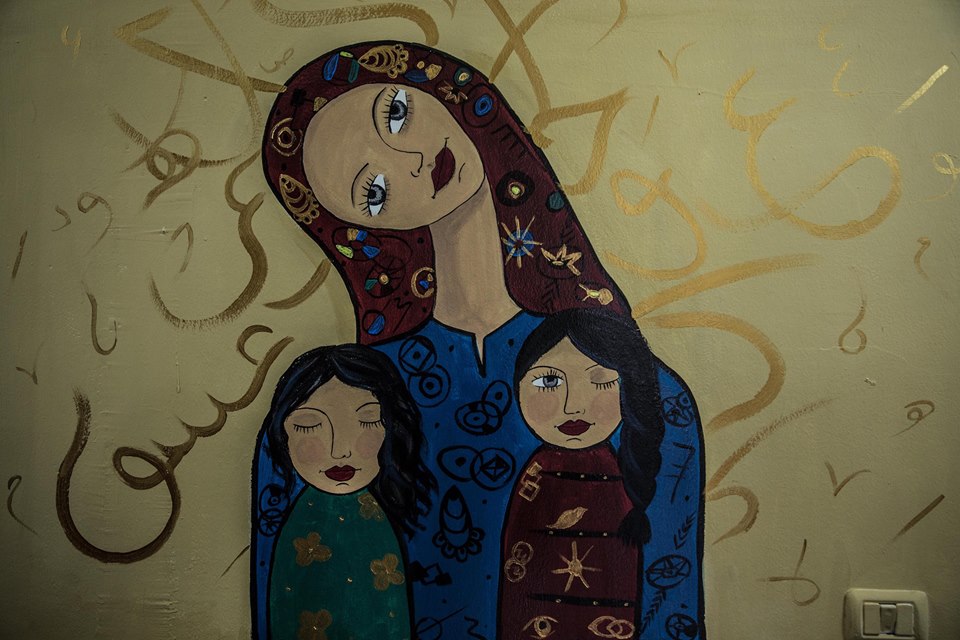Preparing for an uncertain future

On the third floor of a building in a small village in the Lebanese Bekaa Valley is a centre of the NGO Women Now for Development, an organisation founded by Syrian writer Samar Yazbek and operating in Syria, Lebanon and France to support and empower female refugees. Not far from here, hidden behind a mountain chain, is the Syrian border. Between the fields and villages, several refugee camps are set up. The sky is wide, not much is going on in the streets below: someone is selling popcorn and sandwiches from a trolley; an elderly lady is taking a walk.
Almost only Syrians work in the centre, a few men but mostly women. One of the many aims of Women Now for Development is to help Syrian women to find a job – partly by providing job opportunities within the NGO. For example, the organisation operates a kindergarten. It also provides a nursery for the kids of the women who are taking classes at the centre. It is in a room with colourful decorations and toy blocks on the floor. This is where Mahaba, who came from Syria as a refugee and prefers to use her first name only, works as a childcare assistant.
“Since I started taking courses and also working in the centre myself, I’m living in another world.”
“When I first came to Lebanon with my parents and children, I felt very isolated and lonely. Most of my time I spent at home”, Mahaba remembers. Other women then told her about Women Now for Development, where there were courses and possibilities to meet other people.
“Since I started taking courses and also working in the centre myself, I’m living in another world”, she says.
After trying different courses, working as a make-up artist and completing a childcare training program, Mahaba learned of the vacancy at the Women Now for Development nursery and applied for it. Since then, she has a job where she is working six hours a day and can feed her family.
This is not how all of the NGO’s staff got their jobs. The centre’s computer trainer for example, is studying IT at a local university and got her job through this qualification.
“Being able to be productive, to feel that there’s a meaning to their existence despite all the difficulties has given many refugee women a sense of purpose that was much needed.”
Dana Sleiman from the UNHCR, the UN body working for refugees, says there are several similar projects in Lebanon where women are supported in their professions. Many others find low-paying jobs, mainly in agriculture.
“Some women have found jobs such as peeling onions or potatoes or working the land in the fields in the Bekaa Valley”, says Sleiman.
More fulfilling job opportunities and courses available for refugees in Lebanon are limited. There are also lots of new challenges, because in Syria before the war, people’s livelihoods were mainly ensured. Children received free school education and people had free access to the health care system.
“Given these circumstances, being able to learn a skill, being able to be productive, to feel that there’s a meaning to their existence despite all the difficulties has given many refugee women a sense of purpose that was much needed in this time of difficulty,” says Sleiman.
According to the UNHCR, around 1 million refugees from Syria are now registered in Lebanon, but the unofficial number is around 1.5 million. The proximity to Syria, as well as the common language and culture, are some of the reasons for Syrians not trying to reach a third country. 17 per cent of Syrian households in Lebanon are run by women, but the number is higher in the Bekaa, where more than one quarter has a woman as head of the family.
In most of these households, as in the case of Mahaba, the husband has left for another country. Mahaba’s husband went to Germany as a refugee. Since then, she alone is responsible for getting her two children to school and preparing a warm meal.
Her husband tried to go back to Lebanon to visit her, but was rejected at the airport in Beirut because he had entered Germany illegally.
Before the war, it was not uncommon for Syrians to stay in Lebanon for long periods of time, to work in agriculture or construction. Many worked in the Bekaa already then, but they would leave after a period of work and return home to Syria. Today, these jobs are still among the few where registered refugees are allowed to work legally.
“Of course, if you were to gage the pros and cons, all the refugees would tell you that they will go back to Syria in a heartbeat, back to the lives they had, because it was secure, it was dignified,” says Sleiman.
When the war is over, many plan to return, even if they cannot foresee today when that moment will come. Until then, people continue to build their lives in Lebanon, with everything that belongs to it.